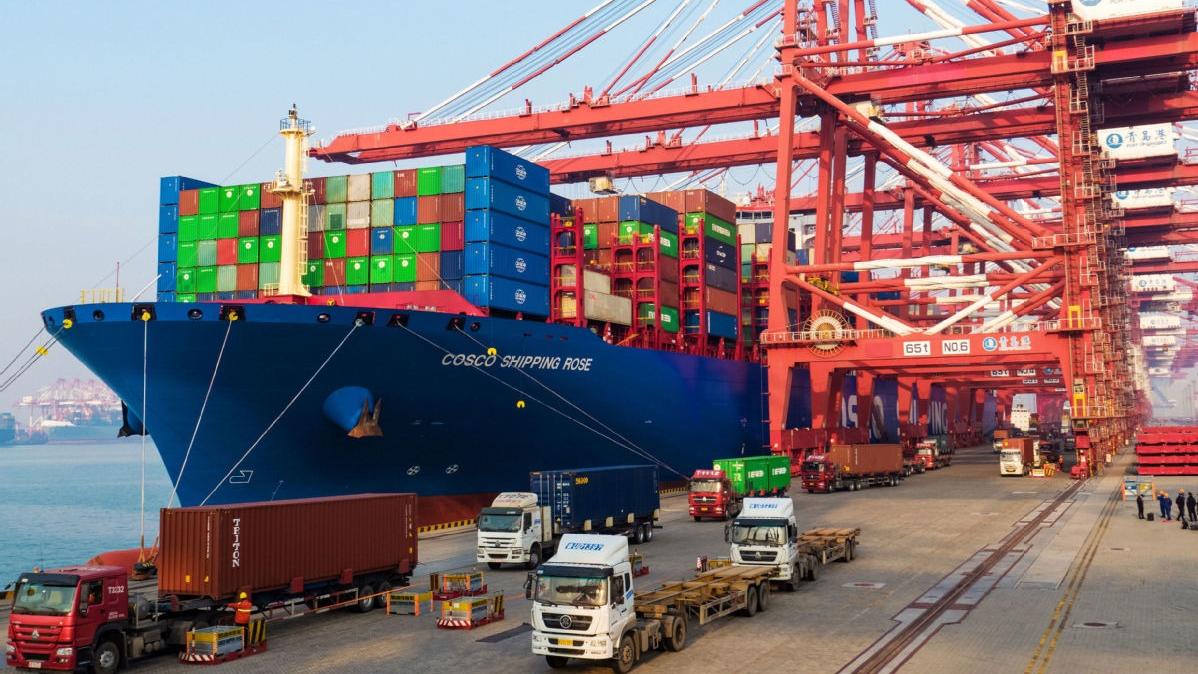 A container ship docks at a port in Qingdao, east China's Shandong province, on Jan 9, 2019. (YU FANGPING / CHINA DAILY)
A container ship docks at a port in Qingdao, east China's Shandong province, on Jan 9, 2019. (YU FANGPING / CHINA DAILY)
Trade between China and the United Kingdom showed slight signs of recovery in April, following significant COVID-19 related disruption, according to Liu Xiaoming, China's ambassador to the UK.
Liu said that "Cold War rhetoric" spewed by a minority of British politicians was counterproductive to bilateral efforts to get business and investment back on track.
Liu said the novel coronavirus crisis has had a deep impact on bilateral trade between China and the UK, which was down 19.3 percent between January and April. During the period, UK exports to China decreased by 13.1 percent and China's exports to the UK decreased by 21.8 percent.
Though we still suffered a decrease (in China-UK trade) of 13 percent, the decline is slowing down. So, I would say that in the middle and long term, because our economies are very complementary to each other, the business confidence is still there
Liu Xiaoming, China's ambassador to the UK
ALSO READ: Envoy: China, UK to fight epidemic with stronger trust
"But April showed some encouraging signs," Liu said. "Though we still suffered a decrease (in China-UK trade) of 13 percent, the decline is slowing down. So, I would say that in the middle and long term, because our economies are very complementary to each other, the business confidence is still there."
Liu, who was speaking during a web event hosted by the Confederation of British Industry, or CBI, on Wednesday, came out against a vocal minority of British politicians who are calling for the UK to distance itself from China amid recent tensions with the United States.
"We have heard some politicians spreading this argument for decoupling, and some even go as far as (using) Cold War rhetoric against China," Liu said."That is very harmful."
Liu said the embassy is working hard to reassure the Chinese business community that these views do not represent those of the UK government.
"I have had good conversations with the British secretaries and senior officials," Liu said. "They have told me these words do not represent the UK government's position."
Meanwhile, another 363 COVID-19 patients had died in Britain in the latest 24-hour period, taking the total coronavirus-related death toll to 35,704, Culture Secretary Oliver Dowden said on Wednesday.
Separately, British Prime Minister Boris Johnson said on Wednesday a "world-beating" program to test and trace those suspected of having been in contact with people who have tested positive for COVID-19 would be in place by June 1.
Slaughterhouse infections
In France, 109 people had tested positive for virus at a slaughterhouse in western France's Cotes d'Armor following a second wave of testing, the regional health authorities said on Wednesday.
The cases follow coronavirus outbreaks at meat plants not only in France but also in Germany, Spain, Australia, the United States and Brazil-where people tend to work in close proximity.
France's coronavirus death toll increased by 110 on Wednesday, taking the tally to 28,132, data released by the health ministry showed.
In Spain, the government on Wednesday won a key parliamentary vote in order to extend the State of Alarm in the country until June 7, despite criticism from opposition parties.
Prime Minister Pedro Sanchez noted that the measure was "the only possible way to combat the virus efficiently", and promised it would "not last one day longer than necessary."
Further, he said: "Nobody has the right to throw away what we have all achieved together."
READ MORE: BRI: China envoy highlights new opportunities in Sino-UK ties
As of Wednesday the number of COVID-19 infections in Spain was 27,888, an increase of 95.
In Russia, the official coronavirus death toll rose to 3,099 on Thursday after officials said 127 people had died in the previous 24 hours.
Russian authorities reported 8,849 new cases of the novel coronavirus, pushing the nationwide case tally to 317,554.
Chen Yingqun in Beijing, Xinhua and agencies contributed to this story


